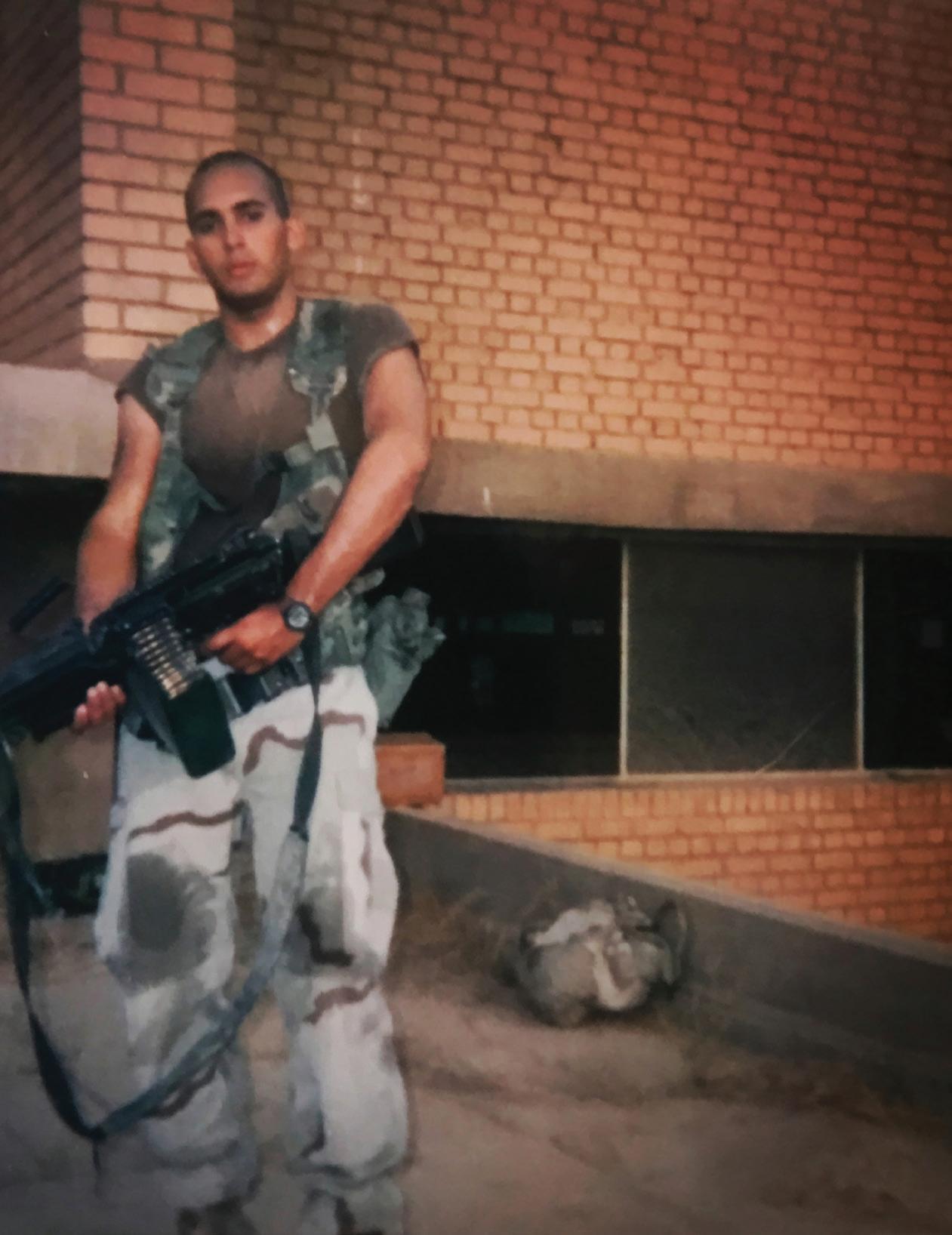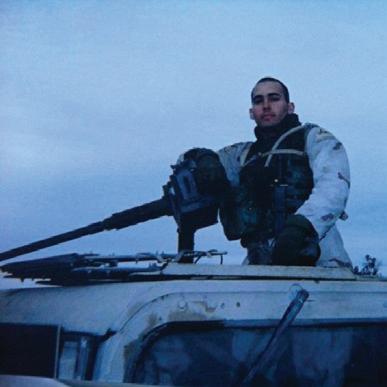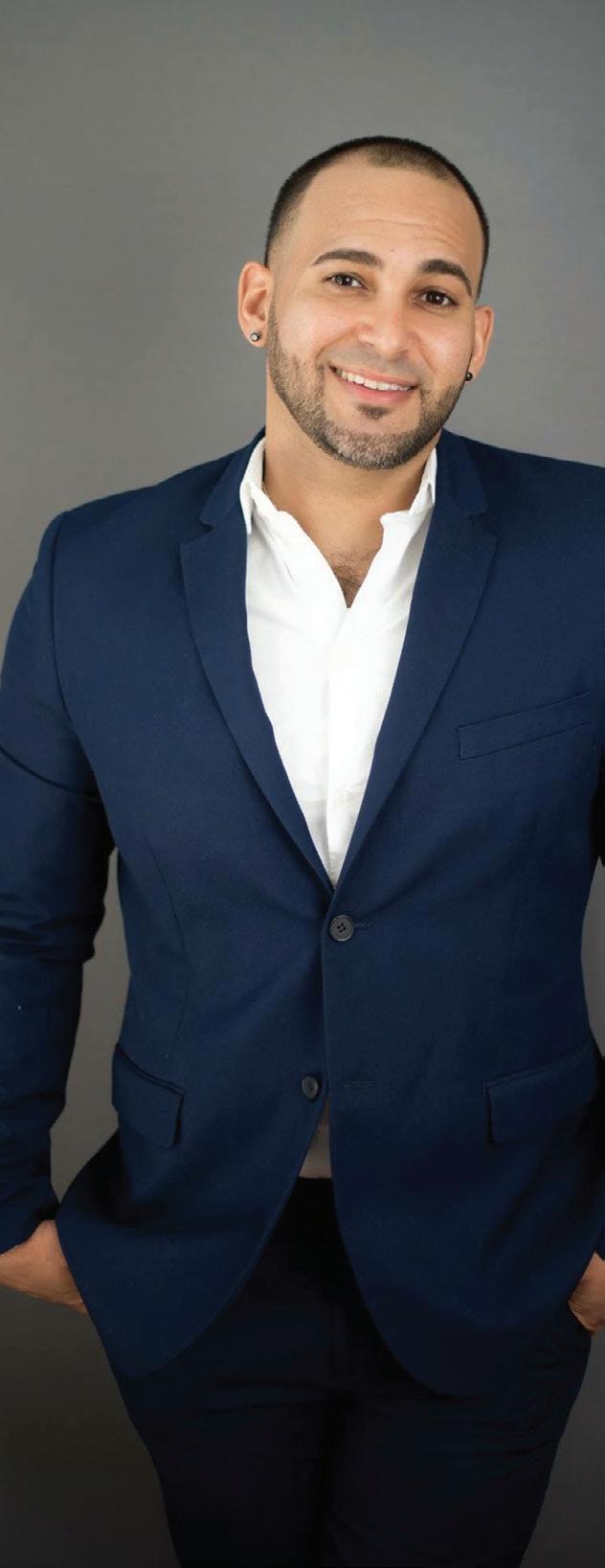
7 minute read
Surviving The War Within
BY ANTONIO DEROSE

Advertisement
Jose Belen is a decorated United States Army Combat Veteran. After enlisting in the Army at age 19, he was soon deployed to Iraq during the initial Oper- ation Iraqi Freedom invasion, where he spent 14 con- secutive months in combat before being honorably dis- charged in 2005. After exiting the military, Jose moved to Florida, where he began to focus on raising his fam- ily, and over the next decade, he created a successful corporate career in real estate and insurance. On the outside, it seemed Belen had successfully left the war behind him, but beneath the surface, Belen was bat- tling the war within his own mind as he silently com- bated the debilitating effects of Post Traumatic Stress Disorder (PTSD). Then, in 2016, after spending what felt like a lifetime fighting his personal demons, thoughts of suicide almost ended everything. It was at this point in time when Belen decided to make his last stand. Despite facing overwhelming odds, he managed to overcome his trauma, and began lead- ing a charge for veterans everywhere. Inspired by his personal victory, Belen and his wife Danielle found- ed Mission Zero in 2017, an organization dedicated to ending veteran suicide through the research and development of new holistic healing and educational pathways to set a new standard for mental health and wellness. They do this by developing targeted educa- tion and advocacy campaigns, organizing family sup- port initiatives, and spearheading suicide prevention efforts. “We believe the mental healthcare system, both past and present, must have their systems disrupted and dissected into new modalities that are strategically developed and executed with precision. We are heavily involved in political conversations and lobby for change to the systems currently in place”, says Belen. “I spend a lot of time in Washington D.C. throughout the year, establishing meetings with political figures and their of- fices in hopes of positively leveraging my influence to steer the ship into the right direction for veterans.” The married couple also helps business owners expand veteran outreach and hiring programs, as well as run coaching initiatives for veterans.




Now it’s 2019, and although Belen seems to be winning his war, he admits, “It is extremely difficult for a veteran once he is out of service to assimilate into the father or husband role without letting the things we experienced in service or in combat affect us. The veteran may physically leave the combat zone, but the combat zone never leaves the veteran.” As a result, veterans often bring their wars home with them in a way, and Belen shares, “The family aspect has been one of the more difficult things for me since I left the service, because for veterans like myself, and non veterans, who have PTSD or mood instability disorders, we sometimes do not realize there is anything ‘wrong’ per say. We feel like we can handle the weight of the world and can self-manage the intrusive thoughts or random outbursts of sadness or anger. In a way we normalize it as ‘this is why I am’ and that is that. But that thought process can do more damage than good. Those around you can not only see the pain you are in, but they can feel it as well in a way. I witnessed a child die in combat to the point where me and two oth- er soldiers closed her eyes. That right there is the single most polarizing thing I have ever seen in my life, and to this day, I am haunt- ed by it. My daughter looks very similar to the child, and I cannot, at times, see my daughter laying flat on her back because I see the little girl dying again and again. I still struggle with this to this day, but thankfully through prayer, my support system, and cannabis, I am able to manage it now more than ever.” An outspoken advocate for cannabis as med- icine and access for veterans, Belen is one of the six individuals and organizations involved in the federal lawsuit regarding the removal of cannabis as a Schedule I drug. He tells us that being a part of the lawsuit is a blessing, and “The lawsuit represents truth and righ- teousness on behalf of the millions of families who have had their lives ruined by this false pretense that cannabis is a ‘gateway drug’ and is a threat to humanity. The reality is, the government became the threat to humanity by keeping it away from us. The hypocrisy is so blatant and bold. I mean for crying out loud, when George Bush was shot down during WW2 his parachute was made of hemp and his airplane’s engine was greased with hemp oil.” When asked why he supports cannabis for veterans, he told us, “Cannabis has allowed me to find a connection with my old self, in a way. Leaving the military, I struggled, and still do, though not as severely, with lack of emotion, hyper alertness, anxiety etc., but the holistic components of cannabis allow me to be much more in tune with my emotions.
For example, it helps me with my reactions to certain sce- narios and triggers that weren’t better before I started using cannabis regularly.” Before turning to cannabis for help with the symptoms as- sociated with his PTSD, Belen traveled the same road as do many other veterans. A road that sadly, often ends in suicide. Between 2005, leading up to almost losing it all in 2016, he turned to the VA for help. He tried a variety of dif- ferent therapies, including cognitive, EMDR (Eye Movement Desensitization and Reprocessing), art therapy, and private services. None of the various therapeutic methodologies seemed to help. This is “sadly why many veterans lose hope and turn to drugs or suicide. It’s also why it seems all doctors can do for us is give us prescription medications in hopes they will help us,” and this is exactly what happened to him. After failing to find a therapy that worked, Belen was then prescribed an array of pharmaceuticals he was told would help him feel better, “but the reality is, the prescrip- tions I was given made me worse, far worse, than when I wasn’t on anything. I was given different pills every time, and every time I was one step closer to killing myself.” This caused turmoil at home and started to take a toll on his family. “Honestly, it was very traumatic for them, espe- cially the kids. My wife and I have been together almost 10 years now, and it wasn’t until about 2 to 3 years into our relationship that she began to realize how bad I was and how much worse I was getting. I remember telling her one day that she was going to come home and find me with my brains blown out all over the wall. I hate to be so graphic, but it is the truth. By the grace of God she never judged me and still does not to this day. My kids also understand as well now. We are a very, very tightly knit family. The thing is, I still struggle, so it is a constant reminder every day for me to fight forward not only for me, but more importantly for them.” Unfortunately, this is a very familiar story for many veterans and their families. This is why Belen is still leading a charge for a better country. In addition to advocating for canna- bis, he is driven by social change, activism, and awareness for the veteran suicide epidemic we are currently facing as a nation. His message to veterans struggling is that, “It is ok to accept they have PTSD. That we can all say, ‘I have PTSD, but PTSD doesn’t have me!’ We are one another’s hope so we cannot give up on ourselves because we’re just giving up on each other. We need one another. There are 20+ million of us in the US. It’s time we band together just like we did in combat and fight forward. Having each other’s six no matter the time or distance. Mission Zero is within us all. Please check in on your brothers and sisters from time to time. It’s often those that are smiling that are suffering the most.” The next step in Belen’s mission is having launched Espe- ranza Essentials. Esperanza is Spanish for hope, and this CBD brand follows Mission Zero’s mantra of providing hope to the hopeless. Their goal is to secure sponsorships from other companies in order to provide their CBD oil to veter- ans in need, at no cost. Combat veteran owned and oper- ated, they are committed to creating a system of care the government could not provide them, and as Belen puts it, they “want to make the care in healthcare relevant again.” They see cannabis as a healthy and holistic means to do so, and they hope it can provide much needed reinforcements to help soldiers survive the war within.











